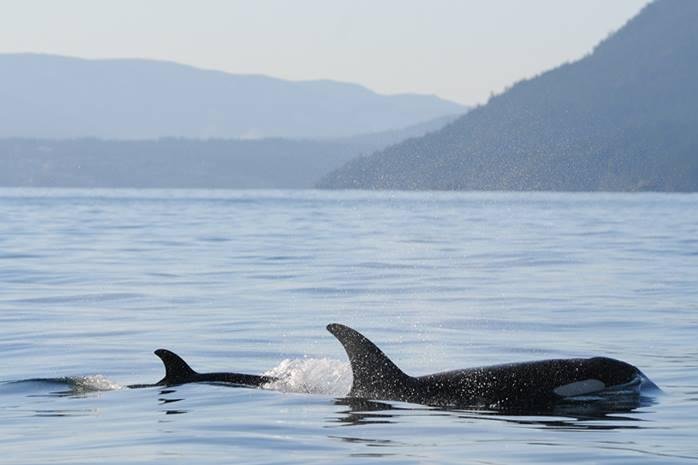The first photo of orca calf J-50. Photo by Ken Balcombe/Center for Whale Research.
SEATTLE, Jan. 6 (UPI) -- For the first time in two years, a local population of killer whales in the Puget Sound has a new member -- an orca calf, only a week old.
Biologists say the baby whale offers hope for a group of endangered killer whales, known as J-pod, that just last month lost a pregnant 19-year-old female orca.
Biologist Ken Balcomb, a scientist at the Center for Whale Research, first noticed the orca calf last week while monitoring the pod. He says the birth is a good sign, especially after so much reproductive potential was lost with the death of J-32.
The baby killer whale has been designated J-50; it's the 78th orca in the population, which mostly cruises the waters off the coast of Washington State and British Columbia.
In addition to what's likely one of the world's youngest killer whales, J-pod also boasts the world's oldest orca. The matriarch of the J-pod, lovingly referred to as "Granny," is estimated to be 103 years old. Most orcas don't make it past 70.
Granny is a remarkable story of perseverance for a species increasingly threatened by a diminished food supply. Killer whales were once under threat of capture -- their numbers dwindled in the 1960s and 70s as the local population was targeted for captive display -- but now their main obstacle to stability is a declining Pacific salmon population.
Granny and her pod normally stick to the Pacific Northwest, but were seen as far south as Southern California this summer.
Biologists are hopeful that the new orca calf will survive. The first few months of a baby whale's life are risky. The pod is currently in the Georgia Straight, near Vancouver Island, an area known for bad weather and rough seas. Scientists will be able to learn more about the new calf and determine which pod member is the baby's mother once the group moves into a part of the Pacific more conducive to observation.















